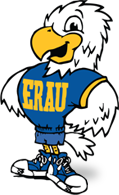So, you’re about to start your first semester here at Embry-Riddle! You’re most likely in some general education classes, and University 101 (or an equivalent class). This class is super important to jumpstart one of the most important planning processes during your time at Embry-Riddle: Degree Planning. While it may seem confusing and a bit tedious at first, having a solid degree plan your first semester will set you on a path for success over the rest of your time at Embry-Riddle. Here are some helpful tips from someone who has had to create and revise their degree plans so many times.
Tip #1: Look at the flow chart for your specific degree – Most degrees at Embry-Riddle have flow charts created by the academic advisors for your specific degree that show the ideal progression of courses you will take. While it is often not the only sequence courses can fall in, it can offer helpful information, such as if courses are only offered in a specific semester or if there are different elective options to choose from.
Tip #2: Meet with your academic advisor – Your academic advisor is probably your most useful resource when it comes to degree planning, and meetings with them (whether in their office or on Microsoft Teams) can help clear up any confusions you may have about your plan or help sort through any roadblocks. They are especially helpful if you need to get any course prerequisites waived, or have conflicts between course offerings.
Tip #3: It can help you plan a minor – This tip might sound a little more unexpected, but degree planning can help you add that minor that you’ve been debating on declaring. Once you have finalized your degree plan for your degree, it can show what open electives and other spots in your degree are free to add courses towards a potential minor. For example, I had 2 open elective spots in my finished degree plan at the end of Freshman year. Because of this, I was able to declare a minor in Emergency Management since it only required an additional 2 courses on top of the courses for my degree, and I had the space. I didn’t think I would be able to add a minor until my completed plan showed me that it was possible.
Hopefully, these tips will come in handy for anyone planning out their degree, whether you are a freshman who just got to Embry-Riddle, or a current student who is in the process of changing your major.



